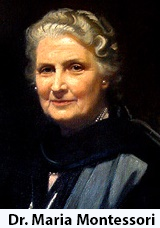Montessori
About Montessori
 "The goal of early childhood education should be to activate the child's own natural desire
to learn". - Dr. Maria Montessori.
"The goal of early childhood education should be to activate the child's own natural desire
to learn". - Dr. Maria Montessori.
The Montessori Philosophy empowers children to grow on their own pace. They cultivate a love for learning, primarily because solutions are not handed to them. This makes them think on their own and feel confident. Montessori education goes beyond preparing for College/University; it is a preparation for life itself. The fundamental flexibility of this philosophy is that each child‟s needs are accommodated, regardless of their learning style, academic progress, or age.
This program was developed by Dr. Maria Montessori, Italy‟s first female physician. After countless hours observing adolescent behaviour, Dr. Montessori recognized that early childhood education is most effective when children are given the liberty to act freely in a specifically prepared environment. Along with committed teachers, children are provided with an atmosphere that helps them flourish and reach their full potential.
Key Principles of Montessori
- Child-Led Learning: Where curiosity sparks the journey. Facilitator guides, child leads.
- Hands-On Materials: Scientific materials to learn educational concepts.
- Mixed-Age Groups: Children of different ages learn, mentor and grow together.
- Structured Freedom: Children have freedom to choose lesson and discover, but it‟s within the structured environment. Hence, it encourages self-discipline and responsibility.
- Individualized Education: Customized teaching to your child‟s unique need and style.
- Focus on Self-Reliance: Building confidence and a sense of accomplishment.
In a nutshell, Montessori is about letting children explore, learn and grow in a supportive and structured environment.
